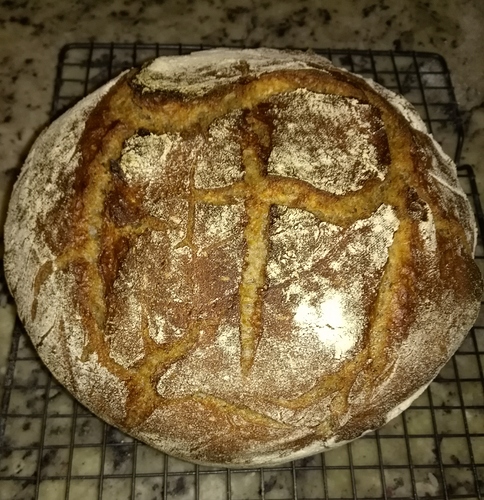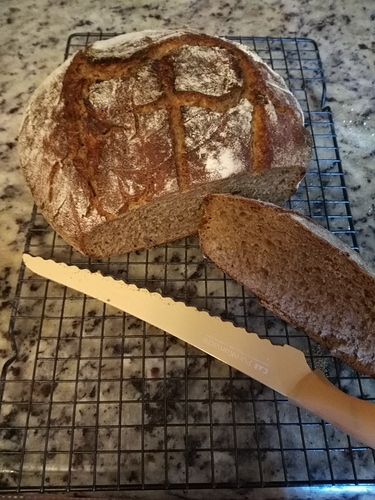My first attempt at baking sourdough with my newly made starter! After batch ferment, dough was VERY wet, and totally impossible to shape. So I put it into a well oiled (probably should have used baking paper?) cast iron loaf oven and let it final rise in there. It was in the sun so it did warm up somewhat. Baked at 30 minutes covered 15 uncovered produced a delicious result! (I forgot to slash it)
I’ve made this bread several times but the dough never looks as manageable as it does in your video. I bought a scale so I could make sure my amounts were exact and the dough still comes out unbelievably sticky. When I reduce the water amount I’ve noticed it becomes a a bit dense and looses its loft. Any suggestions. Oh, btw, I’m in NC and my sourdough starter is good, the dough rises super well, so no problems there.
Thank you! I watched your two videos…not too long winded for me… and the contents of the videos with the recipes gave me the “a ha” moment I have been missing…some dough is in fact too sticky to handle. I also used a ceramic bowl with a cover to cook in. So, thanks for that idea too. The bread was amazing. I made two changes. I used maple syrup instead of molasses and I ground a few grams of the seeds inside star anise pods (a different plant altogether) instead of anise. I also broke down and purchased a digital kitchen scale and a not quite instant read thermometer. Did I mention the bread was amazing?
Followed the exact recipe using store bought King Arthur Flour, I only included Sun Flower Seeds the others were omitted. My starter was 83% hydration all wheat with 13hr overnight proofing. The loaf came out perfect, excellent tang and oven spring. A great addition to my repertoire, thanks.
I know how you feel with this dough in comparison to the Breadtopia video. No matter what I’ve done, it borders on soupy after the bulk fermentation. The final product tends to be excellent, which never ceases to amaze me, since the pre-baked dough is consistently very wet, very sticky. I’ve also got a digital scale, so I have no doubt that my ratios correspond to the recipe. My dream is one day actually to hold unbaked, rye dough successfully in my hand. At least for a moment…
A couple things:
- Rye dough is always very sticky compared with wheat flours.
- Because so many things that really matter in baking a loaf of bread (especially when leavening with sourdough and baking with heirloom gains) are impossible to account for in a recipe, including variations from one flour to another, variations in proofing temperature, variations in starter activity, etc, etc, etc, I think that you should always use the specifics of a bread recipe as just a starting point and freely modify to compensate for your present conditions. Modifications that I find myself making on almost every bake include the hydration level and the bulk proofing time.
If you are always getting dough that is way too wet, try increasing the amount of flour (or decreasing the amount of water) in 50g increments.
If the dough starts off workable and then becomes too soupy by the end of your bulk proofing period, try decreasing the bulk proofing time in increments of an hour or even two.
I tried it again with slightly lower hydration, and that really made a difference in how manageable the dough was. Thanks for all of the pointers! I’ve always loved the flavor of this loaf, which is now even more doable.
Hi! Are you using a 100% hydration rye starter for this bread? I tried making it with a starter just like that and my dough turned out to be very very wet and sticky. My flattened loaf of bread still tasted amazing after it was baked- I just need to troubleshoot what went wrong. 
Hi, thank you for welcoming me. I made your rye sour dough bread with my starter and it worked beautifully. I’m trying it again with yeast. I have a question, however: why don’t I need to knead this dough?
Thanks, Daniel
This Rye is one for the ages, a keeper
One thing I like is a good hearty sandwich with lots of condiments (Lots)
So it takes a good bread right?
This one hit it out of the park! I made a thick Pastrami sandwich with lots
Of stuff and that pup was heavy, That bread did not get soggy!
Here’s the best part, It is very aromatic with a flavor to match and they
Both enhance the flavor of the pastrami~
With this recipe you can’t go wrong.
I have been making no-knead artisan sourdough bread for several years now and I always get excellent results. I have a very healthy starter which I have been using for about 10-12 years. I just tried to make the Artisan Sourdough Rye Bread by following the recipe exactly as posted. I made the dough early in the afternoon, then placed the covered bowl in the refrigerator until we went to bed at 10 PM. Then I pulled it out of the fridge, and placed it on the kitchen counter until this morning. After 10 hours of proof time, I tried to shape the dough for the second rise. I realize it is supposed to be a wet dough, but this is like baby oatmeal, and it’s impossible to work with it.
I live in Costa Rica at an altitude of about 2500 ft and the current humidity is around 75%. In desperation, I added about ¾ cups of each of the bread and rye flours to try absorb some of the moisture. It is still pretty wet, but I’m going to see what happens in a couple of hours.
Rye flour is impossible to buy here, so a friend brought some Bob’s Red Mill Dark Rye Flour from the States. I really hate to waste this precious commodity, so I would love to get some advice on how to modify this recipe to work in my climate.
Thanks in advance for any help you can give me.
Not knowing what else to do to correct the soupy mess I had, I added about 1½ - 2 cups more flour (½ rye & ½ bread flour) and let it proof another 3 hours. It was still a very wet dough, but I stretched and folded it as best I could and gingerly put it in the banneton for another hour for final proofing. I heated my enameled cast iron dutch oven to 475°F. then "poured the dough into the dutch oven. Here are the results. Flavor is terrific, but I still need to tweak it a bit for a better crumb.
I am very grateful for all the comments on this forum, it is such a great resource for me.
Philip, I have a bread maker and since making bread by hand, the machine has gathered dust in my pantry. Life is fast enough and the actual act of making bread or anything by hand enables us to slow down and appreciate ‘life’ or what we have left. There is nothing more satisfying than making bread with your hands, and sharing it with family and friends.
This is a very big thank you to Eric. You taught me baking with this video now exactly a year ago. I have been making the Artisan Sour Dough weekly and we love it. I am still working on the last step, getting the dough from the basket into the roemertopf without a big “plomp” and knocking the dough down too much. But I am close to getting those really fantastic large airy holes in the crumb you do. The taste and the smell is unmatched to other recipes I am experimenting with. Thank you, Eric, from all of us, for a year of wonderful home made bread! Christine
Hi Christine,
Congratulations on your successful bread baking. I’m so glad to hear that it’s working out so well for you.
Cheers.
I’ve made this a few times, and each time the hydration seems to produce much more of a batter-glop feel than a dough feel, even with extra folds and stretches. ‘Shaping’ is more like trying to push the glop up into a pile.
Does the fresh-ground rye flour take up more water than regular Bob’s Red Mill whole rye flour?
Thank you so much for this recipe! I have been baking bread for 40 years, but this recipe was my first successful loaf of rye. It was a bit wet, but I am thickening up my starter for the next batch.
I’m distressed! I used 1/2 cup of sourdough starter instead of 1/3. Will my rye bread be okay? Our son and daughter-in-law arrive tomorrow evening and we wanted a great loaf of rye to have with dinner.
The bread should be great with 1/2 cup starter. Volume measurements are approximate anyway. If i stir down my starter, 1/3 cup is many more grams than if I pour it fluffy into the 1/3 cup.
More starter means the dough will be done with the bulk ferment a tiny bit faster than it might have otherwise.
Enjoy your dinner tomorrow!
Thanks so much, Melissa! I’m so relieved! Will be baking soon(ish) and look forward to sharing it for dinner.

